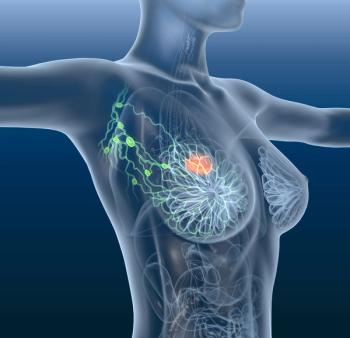
Breast Cancer
Latest News
Latest Videos

Podcasts
More News


Early Efficacy Seen With Gedatolisib-Based Therapies in Prostate/Breast Cancers
Gedatolisib showed promising ORRs when given in combination with darolutamide and trastuzumab biosimilar in mCRPC and mBC, respectively.

Deciding when to use immunotherapy and how to utilize antibody-drug conjugates are complicated processes that require multidisciplinary collaboration to ensure that all patients with breast cancer receive appropriate and efficient care.


21 Distant Disease-Free Survival Across Key Subgroups From the Phase 3 NATALEE Trial of Ribociclib Plus a Nonsteroidal Aromatase Inhibitor in Patients With HR+/HER2− Early Breast Cancer

Cardio-Oncology Considerations for Breast Cancer: Risk Stratification, Monitoring, and Treatment
Survivors of breast cancer face increased cardiovascular risks due to treatment-related cardiotoxicity, and understanding these risks is crucial for effective management and prevention.

22 Efficacy and Safety of Ribociclib + Nonsteroidal Aromatase Inhibitor in Younger Patients With HR+/HER2− Early Breast Cancer in NATALEE

Retrospective analysis at SNMMI 2025 revealed α-FRT with 225AC-3BP-3940 was well tolerated and elicited responses in pretreated metastatic breast cancer.

23 Clinical Outcomes in Patients With HR+/HER2− Early Breast Cancer By Prior Systemic Treatment: A Subgroup Analysis of the NATALEE Trial

TPS 24 Phase Ib Dose-Finding Study of [177Lu]Lu-NeoB + Ribociclib + Fulvestrant in Patients With ER+/HER2− Advanced Breast Cancer With GRPR Expression With Early Relapse FromAdjuvant Endocrine Therapy or Progression on ET + CDK4/6i for ABC

TPS 25 Phase 1/2 Study of the Novel Radioligand Therapy [177Lu]Lu-NeoB Plus Capecitabine in Patients With ER+/HER2− Advanced Breast Cancer (ABC) With GRPR Expression After Progression on Prior Endocrine Therapy Plus a CDK4/6 Inhibitor for ABC


26 Risk of Recurrence in Real-World NATALEE- and monarchE-Eligible Populations of Patients With HR+/HER2− Early Breast Cancer in an Electronic Health Record-Derived Database

Clinical Data May Support PARP Inhibition in Somatic BRCA-Mutant TNBC
Breast oncologist Jade E. Jones, MD, says she tries to send patients with HR-positive BRCA-mutant TNBC to clinical trials that use PARP inhibitors.

Considerations After Initial CDK4/6 Inhibition in HR+/HER2– Breast Cancer
Following progression on a CDK4/6 inhibitor, ascertaining the endocrine sensitivity of HR-positive/HER2-negative disease may inform sequential treatment.


T-DXd improved progression-free survival over standard chemotherapy among patients with HR-positive breast cancer/triple-negative breast cancer in DESTINY-Breast04.

TPS 28 ELEGANT: Elacestrant VS Standard Endocrine Therapy in Women and Men With Node-Positive, Estrogen Receptor-Positive, HER2-Negative, Early Breast Cancer With High Risk of Recurrence in a Global, Multicenter, Randomized, Open-Label Phase 3 Study

30 Imlunestrant, an Oral Selective Estrogen Receptor Degrader, as Monotherapy and Combined With Abemaciclib, for Patients with ER+, HER2– Advanced Breast Cancer, Pretreated With Endocrine Therapy: Results of the Phase 3 EMBER-3 Trial



Elacestrant Regimens Show Activity in Pretreated ER+/HER2– Breast Cancer
Data from the ELEVATE trial may support elacestrant as an endocrine therapy backbone in ER-positive, HER2-negative metastatic breast cancer.

“Higher pretreatment HER2 amplicon mRNA signature and HER2 protein expression predicted improved outcomes with T-DXd for [metastatic breast cancer],” Paolo Tarantino, MD, PhD, said.

Data from DESTINY-Breast09 may support trastuzumab deruxtecan plus pertuzumab as a frontline standard of care in HER2-positive advanced breast cancer.

Data from the phase 3 NATALEE trial confirms ribociclib plus NSAI consistently improves survival outcomes in stage II/III HR+/HER2– early breast cancer patients, regardless of age or menopausal status.































































